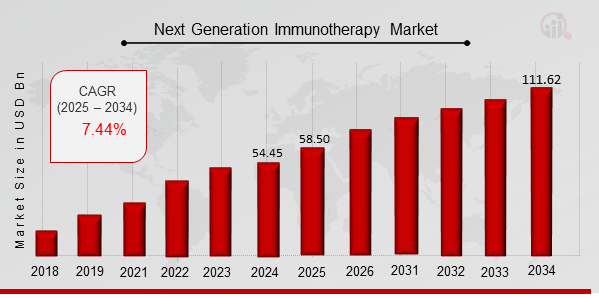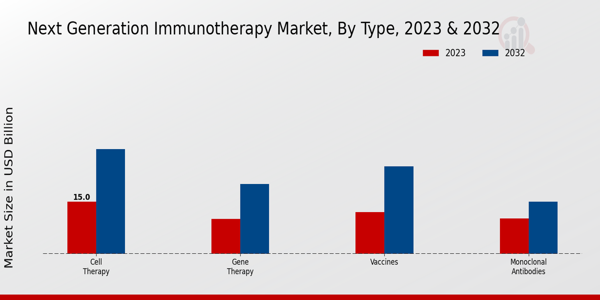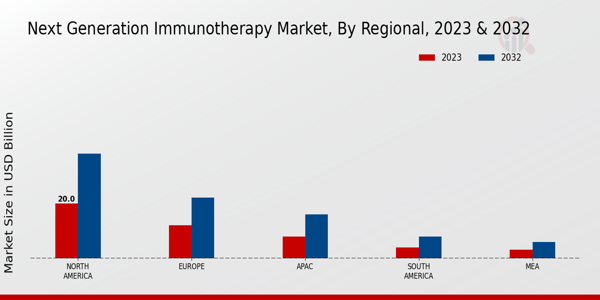Next Generation Immunotherapy Market Overview
As per MRFR analysis, the Next Generation Immunotherapy Market Size was estimated at 54.45 (USD Billion) in 2024. The Next Generation Immunotherapy Market Industry is expected to grow from 58.50 (USD Billion) in 2025 to 111.62 (USD Billion) till 2034, at a CAGR (growth rate) is expected to be around 7.44% during the forecast period (2025 - 2034).
Key Next Generation Immunotherapy Market Trends Highlighted
The Next Generation Immunotherapy Market is experiencing significant growth driven by several key factors. The increasing prevalence of cancer and autoimmune diseases necessitates innovative treatment options that are more effective and patient-specific. Advancements in genetic engineering and biologics have improved the precision of immunotherapies, leading to better outcomes for patients. Additionally, the rising investment in research and development by pharmaceutical companies plays a crucial role in the expansion of this market. Increased awareness and understanding of immunotherapy's benefits among healthcare professionals and patients further fuel demand, contributing to market growth.Amidst the evolving landscape, there are numerous opportunities to be explored. The success of personalized medicine opens pathways for the development of targeted treatments that cater to individual genetic profiles. Emerging technologies, such as artificial intelligence and machine learning, can enhance drug discovery and patient monitoring, making immunotherapy more accessible and efficient. Collaborations between biotech companies and academic institutions can lead to innovative therapies and combination treatments that improve patient outcomes. Additionally, expanding into emerging markets presents a chance to increase market share, given the rising healthcare expenditure in these regions.Trends in recent times indicate a shift toward combination therapies that integrate immunotherapy with traditional treatment methods, enhancing overall effectiveness. The focus is also on developing treatments that minimize side effects, allowing for better patient compliance. Regulatory environments are becoming more favorable, easing the approval process for new therapies. The growth of partnerships and collaborations signifies a collective effort to advance research and improve treatment protocols. All these aspects contribute to a vibrant ecosystem poised for transformation in the way diseases are treated, with immunotherapy at the forefront of this change.

Source: Primary Research, Secondary Research, MRFR Database and Analyst Review
Next Generation Immunotherapy Market Drivers
Increasing Prevalence of Cancer and Autoimmune Diseases
The rise in the incidence of cancer and autoimmune diseases is a significant driver fueling the growth of the Next Generation Immunotherapy Market Industry. As the global population ages, the frequency of these chronic conditions has escalated, prompting an urgent demand for innovative therapeutic options. Traditional treatments often fail to provide adequate results or come with debilitating side effects, leading researchers and healthcare providers to seek more effective therapies.Next generation immunotherapies offer a refined approach by harnessing the body's immune system to specifically target and eradicate diseased cells, therefore presenting a promising alternative. Moreover, advancements in our understanding of immunological mechanisms and tumor microenvironments have led to the development of more personalized and effective modalities. This shift towards personalized medicine ensures that treatments can be tailored to the individual patient's needs, improving outcomes and satisfaction.Furthermore, as clinical trials for these therapies continue to yield positive results, the pharmaceutical industry's confidence in investing resources in the Next Generation Immunotherapy Market has surged. Pharmaceutical companies are increasingly allocating funds towards R in this area, which is critical in accelerating the discovery and approval of new therapies. In addition to cancers, the growing recognition of immunotherapy's potential benefits for autoimmune diseases is expanding the scope of research and development within the field.With numerous clinical trials underway and a plethora of ongoing research projects, the next wave of immune-based therapies could revolutionize the treatment landscape across various disorders, thereby further propelling market growth into the future.
Technological Advancements in Immunotherapy
Recent technological breakthroughs in immunotherapy are major catalysts for the growth of the Next Generation Immunotherapy Market Industry. Innovations such as CAR-T cell therapy, bispecific T-cell engagers, and immune checkpoint inhibitors have paved the way for more effective treatment modalities. These advancements allow for the creation of therapies that can specifically target tumor cells while sparing healthy cells, thereby reducing side effects.Additionally, progress in genomic and proteomic research has facilitated the identification of new targets for immunotherapy, broadening its applications. As more advanced technologies continue to emerge, market stakeholders are increasingly motivated to invest in the development of next generation immunotherapeutics.
Growing Awareness and Acceptance of Immunotherapy
There has been a marked increase in awareness and acceptance of immunotherapy among healthcare professionals and patients alike. Educational initiatives and campaigns aimed at dispelling myths surrounding immunotherapy have contributed to improved knowledge about the potential benefits and effectiveness of these treatments. As more healthcare providers become familiar with the successes of immunotherapy in clinical settings, they are more likely to recommend these therapies to their patients.This shift in perception is crucial for boosting patient enrollment in clinical trials and driving the adoption of next generation immunotherapeutics, thereby positively impacting the Next Generation Immunotherapy Market Industry.
Next Generation Immunotherapy Market Segment Insights
Next Generation Immunotherapy Market Type Insights
The Next Generation Immunotherapy Market has established a robust framework around its Type segment, which includes various innovative approaches such as Cell Therapy, Gene Therapy, Vaccines, and Monoclonal Antibodies. The market is projected to experience substantial growth, with the Cell Therapy segment leading the way, reflecting its critical role in advanced treatment modalities, valued at 15.0 USD Billion in 2023 and expected to rise to 30.0 USD Billion by 2032. This segment dominates due to its ability to customize treatments for specific patient needs, making it a vital component for addressing challenging diseases like cancer.Gene Therapy holds a significant position within the market as well, valued at 10.0 USD Billion in 2023 and anticipated to reach 20.0 USD Billion in 2032, showcasing its promise in correcting genetic disorders and enhancing the therapeutic landscape. Vaccines are another crucial aspect of this industry, with a valuation of 12.0 USD Billion in 2023, projected to escalate to 25.0 USD Billion by 2032. This segment is critical as it plays a pivotal role in preventive healthcare and infectious disease management, driving innovation and development.Lastly, Monoclonal Antibodies are important in targeted therapies and are valued at 10.17 USD Billion in 2023, expected to reach 15.0 USD Billion by 2032, emphasizing their utility in precision medicine. Overall, the segmentation within the Next Generation Immunotherapy Market underlines a strategic focus on improving patient outcomes through tailored therapeutic options, supported by significant market dynamics and growth opportunities. Each type presents unique advantages, forming a comprehensive landscape designed to transform patient care and achieve better health outcomes.

Source: Primary Research, Secondary Research, MRFR Database and Analyst Review
Next Generation Immunotherapy Market Application Insights
The Next Generation Immunotherapy Market, valued at approximately 47.17 USD Billion in 2023, showcases considerable potential across various applications, including Cancer Treatment, Autoimmune Diseases, Infectious Diseases, and Chronic Diseases. Each application area plays a critical role in shaping the market landscape, reflecting the need for innovative therapeutic solutions. Cancer Treatment is particularly significant due to the rising incidence of cancer globally, encouraging a surge in advancements in immunotherapy. Autoimmune Diseases are also gaining attention as therapies evolve to address complex symptoms and improve patient outcomes.Infectious Diseases benefit from immunotherapy's ability to enhance the immune response, particularly during pandemics. Chronic Diseases, a growing health concern, further contribute to the market, emphasizing the necessity for effective long-term therapies. As these application areas continue to evolve, they are expected to drive demand within the Next Generation Immunotherapy Market, influencing market growth and investment strategies.
Next Generation Immunotherapy Market Technology Insights
The Next Generation Immunotherapy Market, particularly in the Technology segment, is projected to experience significant growth, with a market valuation estimated at 47.17 USD Billion in 2023. This market is driven by advancements in therapies that utilize innovative technologies, which are crucial for developing effective cancer treatments. Various approaches under this segment highlight the diversity in immunotherapy, including CRISPR technology, which offers precision gene editing to enhance immune responses, and CAR T-Cell therapy, known for its personalized treatment capabilities against specific cancer types.Additionally, Checkpoint Inhibitors play a significant role in unleashing the body's immune system against tumors by blocking proteins that inhibit immune responses. Meanwhile, Oncolytic Virus Therapy utilizes genetically modified viruses to selectively target and destroy cancer cells, representing a promising frontier in immunotherapy. Collectively, these innovative technologies demonstrate the potential to improve patient outcomes and reshape treatment paradigms, driving the Next Generation Immunotherapy Market revenue with a focus on efficiency and efficacy.As the market progresses, challenges such as regulatory hurdles and high treatment costs must be navigated, but the opportunities for breakthrough therapies present a robust foundation for ongoing growth.
Next Generation Immunotherapy Market End Use Insights
The Next Generation Immunotherapy Market is poised for significant growth, with a valuation of 47.17 Billion USD in 2023, expanding as demand increases in various End Use categories. Hospitals represent a crucial segment, as they adopt advanced immunotherapeutic practices to enhance patient treatment outcomes, particularly in oncology. Research laboratories play a pivotal role in the innovation of next-generation therapies, driving advancements through extensive research and clinical trials. Pharmaceutical companies are central to the development and commercialization of these therapies, and their involvement reflects the robust pipeline of new treatment options in the market.Meanwhile, biotechnology companies contribute vital insights and technologies that bolster immunotherapy effectiveness. The competition among these sectors fosters a continuous influx of innovative treatments addressing cancer and autoimmune diseases, thereby supporting the overall market growth. Factors such as the increasing prevalence of chronic diseases, technological advancements, and supportive regulatory frameworks further enhance the appeal of investments in these segments, positioning the Next Generation Immunotherapy Market favorably in the healthcare landscape.With anticipated shifts in treatment paradigms and a surge in personalized medicine approaches, the end-use segmentation represents a dynamic landscape ripe with opportunities and challenges, contributing to the evolving ecosystem of immunotherapy.
Next Generation Immunotherapy Market Regional Insights
The Next Generation Immunotherapy Market revenue is showcasing a solid growth trajectory across various regions. In 2023, North America holds a dominant position, valued at 20.0 USD Billion, and is expected to grow to 38.0 USD Billion by 2032, indicating significant market growth potential. Europe follows, with a valuation of 12.0 USD Billion in 2023, projected to reach 22.0 USD Billion in 2032, reflecting its importance in the global industry. The APAC region shows promising growth from 8.0 USD Billion in 2023 to 16.0 USD Billion in 2032, highlighting a rising interest in advanced therapeutic solutions.South America and MEA are smaller markets, valued at 4.0 USD Billion and 3.17 USD Billion, respectively, in 2023, which are expected to double by 2032, indicating emerging opportunities. The majority holding of North America and Europe in the Next Generation Immunotherapy Market segmentation emphasizes their robust healthcare infrastructure and research capabilities, driving innovation and adoption of advanced immunotherapy solutions. Meanwhile, APAC's rapid market growth presents opportunities for investment and development, making it a region of significant interest for stakeholders.

Source: Primary Research, Secondary Research, MRFR Database and Analyst Review
Next Generation Immunotherapy Market Key Players and Competitive Insights
The Next Generation Immunotherapy Market is a rapidly evolving sector that focuses on innovative treatment approaches designed to harness and enhance the body’s own immune system to combat diseases, particularly cancer. This market encompasses a diverse range of therapies, such as monoclonal antibodies, CAR T-cell therapies, and immune checkpoint inhibitors, characterized by advanced methodologies and cutting-edge technologies. As the demand for personalized medicine grows, the competition within this arena intensifies, driven by various factors, including technological advancements, increasing healthcare investments, and a growing emphasis on research and development. Companies strive to differentiate their offerings and create more effective therapies, leading to a dynamic landscape that reflects both opportunities and challenges. The insights gleaned from this competitive setting reveal the strategic maneuvers that organizations undertake to carve out their positions in the market, balancing innovation with regulatory considerations and market access strategies.Roche exhibits a formidable presence in the Next Generation Immunotherapy Market, credited with extensive research and development initiatives that bolster its product pipeline. The company benefits from a strong focus on personalized healthcare solutions, which is aptly aligned with the trends in immunotherapy. Roche's analytical capabilities and commitment to discovering biomarkers allow for precise targeting of therapies to patient populations likely to respond positively. This strengthens its competitive edge, as therapeutic efficacy and safety represent paramount concerns in patient care. Furthermore, Roche’s partnerships and collaborations with academic and research institutions enhance its innovative endeavors, while its established infrastructure supports rapid deployment of its therapies globally. The robust portfolio of immunotherapy products serves as a testament to Roche's strength, evidenced by its ability to respond to changing market dynamics and patient needs effectively.Pfizer has carved a significant niche in the Next Generation Immunotherapy Market through its strategic investments in research and development and its commitment to exploring new therapeutic avenues. The company leverages its extensive experience in biopharmaceuticals to aim at innovative immunotherapies that target a wide range of cancers. Pfizer's adaptive clinical trials methodology illustrates its forward-thinking approach, allowing for quicker integration of feedback and data into the development process, thereby increasing the probability of successful outcomes. The company maintains a wide-reaching global footprint, facilitating access to diverse patient populations and enabling extensive clinical trials across multiple jurisdictions. Additionally, Pfizer's collaborations with various biotech firms and academic institutions amplify its capacity for innovation, ensuring that it remains at the forefront of the competition while striving to meet the evolving demands of the healthcare market. This strong positioning not only reflects Pfizer's capabilities but also emphasizes its commitment to delivering meaningful advancements in cancer treatment options through next-generation immunotherapy solutions.
Key Companies in the Next Generation Immunotherapy Market Include
- Roche
- Pfizer
- Bristol-Myers Squibb
- Moderna
- Eli Lilly
- Astellas Pharma
- Regeneron Pharmaceuticals
- Celgene
- Johnson and Johnson
- AstraZeneca
- Amgen
- Gilead Sciences
- AbbVie
- Merck and Co
- Novartis
Next Generation Immunotherapy Market Industry Developments
The Next Generation Immunotherapy Market is witnessing significant developments, with key players such as Roche and Pfizer investing heavily in RD for novel therapies targeting specific cancer types. Bristol-Myers Squibb continues to enhance its portfolio with recent advancements in its cell therapy applications, while Moderna is focusing on mRNA technology to create personalized cancer vaccines. Eli Lilly and Astellas Pharma announced strategic collaborations aimed at expanding their footprints in combination therapies to improve patient outcomes. Regeneron Pharmaceuticals is also making strides with its investigational treatments showing promise in early trials. Meanwhile, Amgen and Gilead Sciences are exploring partnerships to bolster their immunotherapy offerings. Notably, AbbVie and Merck Co. are actively engaging in merger discussions to consolidate their market positions. AstraZeneca and Celgene are also focusing on expanding their immunotherapy pipelines through acquisitions, reflecting the ongoing trend of consolidation in this competitive market landscape. The overall market is witnessing growth in valuation as innovative approaches and timely collaborations are driving advancements, thus enhancing treatment options for patients and expanding market reach for these companies.
Next Generation Immunotherapy Market Segmentation Insights
Next Generation Immunotherapy Market Type Outlook
- Cell Therapy
- Gene Therapy
- Vaccines
- Monoclonal Antibodies
Next Generation Immunotherapy Market Application Outlook
- Cancer Treatment
- Autoimmune Diseases
- Infectious Diseases
- Chronic Diseases
Next Generation Immunotherapy Market Technology Outlook
- CRISPR
- CAR T-Cell
- Checkpoint Inhibitors
- Oncolytic Virus Therapy
Next Generation Immunotherapy Market End Use Outlook
- Hospitals
- Research Laboratories
- Pharmaceutical Companies
- Biotechnology Companies
Next Generation Immunotherapy Market Regional Outlook
- North America
- Europe
- South America
- Asia Pacific
- Middle East and Africa
| Report Attribute/Metric |
Details |
|
Market Size 2024
|
54.45 (USD Billion)
|
|
Market Size 2025
|
58.50 (USD Billion)
|
|
Market Size 2034
|
111.62 (USD Billion)
|
|
Compound Annual Growth Rate (CAGR)
|
7.44 % (2025 - 2034)
|
|
Report Coverage
|
Revenue Forecast, Competitive Landscape, Growth Factors, and Trends
|
|
Base Year
|
2024
|
|
Market Forecast Period
|
2025 - 2034
|
|
Historical Data
|
2020 - 2024
|
| Market Forecast Units |
USD Billion |
| Key Companies Profiled |
Roche, Pfizer, Bristol-Myers Squibb, Moderna, Eli Lilly, Astellas Pharma, Regeneron Pharmaceuticals, Celgene, Johnson and Johnson, AstraZeneca, Amgen, Gilead Sciences, AbbVie, Merck and Co, Novartis |
| Segments Covered |
Type, Application, Technology, End Use, Regional |
| Key Market Opportunities |
Increasing prevalence of cancer, Advancements in personalized medicine, Rising healthcare expenditure, Growth in clinical trials, Expanding patient access programs |
| Key Market Dynamics |
Innovation in therapeutic approaches, Rising prevalence of cancer, Increased funding for research, Regulatory support advancements, Growing demand for personalized medicine |
| Countries Covered |
North America, Europe, APAC, South America, MEA |
Frequently Asked Questions (FAQ) :
The Next Generation Immunotherapy Market is expected to be valued at 111.62 USD Billion by the year 2034.
The estimated CAGR for the Next Generation Immunotherapy Market from 2025 to 2034 is 7.44%.
North America is projected to have the largest market share in the Next Generation Immunotherapy Market, valued at 38.0 USD Billion by 2032.
The market size for the Cell Therapy segment in the Next Generation Immunotherapy Market is expected to reach 30.0 USD Billion by 2032.
Key players in the Next Generation Immunotherapy Market include Roche, Pfizer, Bristol-Myers Squibb, and Moderna, among others.
The market size for the Gene Therapy segment in the Next Generation Immunotherapy Market is valued at 10.0 USD Billion in 2023.
The market for Vaccines in the Next Generation Immunotherapy Market is expected to grow to 25.0 USD Billion by 2032.
The projected market size for Monoclonal Antibodies in the Next Generation Immunotherapy Market is anticipated to be 15.0 USD Billion by 2032.
Key growth drivers for the Next Generation Immunotherapy Market include advancements in technology and the increasing prevalence of chronic diseases.
The market size of South America in the Next Generation Immunotherapy Market is expected to reach 8.0 USD Billion by 2032.

















